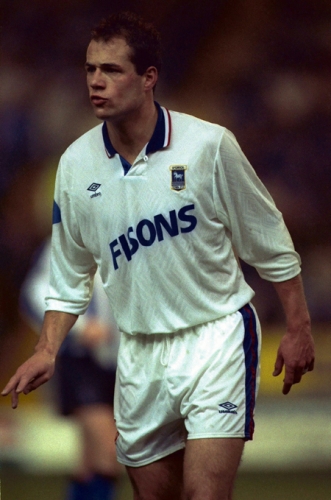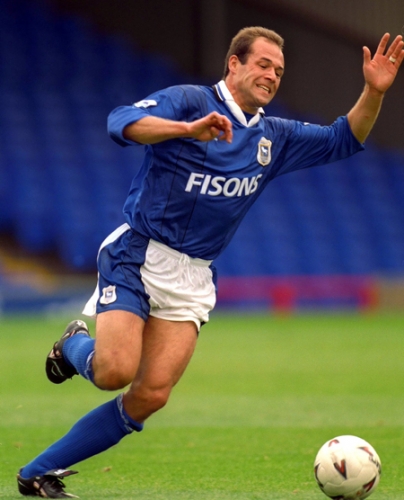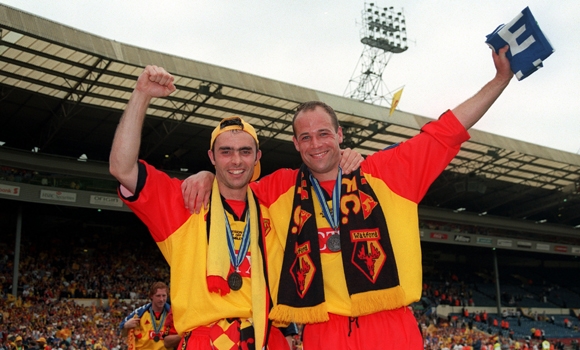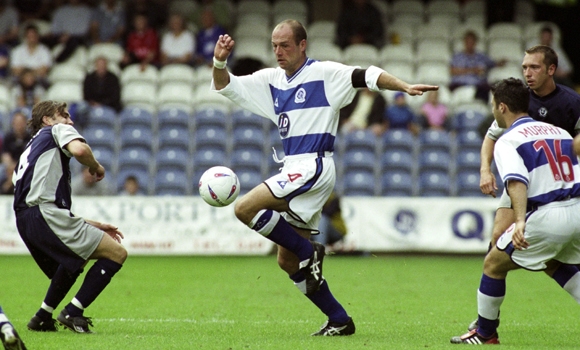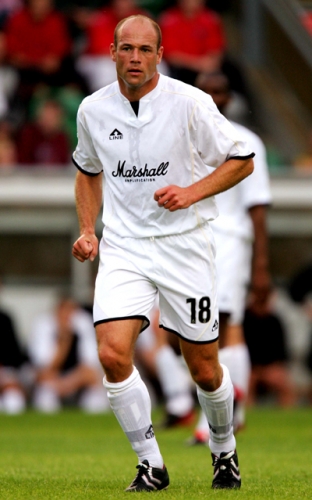The Ex-Files: Steve Palmer Thursday, 25th Apr 2013 10:20 In the sixth part of our regular series, The Ex-Files, in which Blair Ferguson chats with Town stars of the past about their time at Portman Road and what they’re up to now, we catch up with midfielder, cricketer, Cambridge graduate and all-round renaissance man Steve Palmer. Despite being the only footballer of the modern era to have a degree from Cambridge University, Steve Palmer insists that a career as a footballer was his ambition from a young age. "It was always what I wanted to do from being a small child. I had always been around football clubs. “I'm from Brighton and played for their schoolboy and reserve teams but I never actually signed a professional contract, so I was a non-contract player because I decided to continue with my education.” An alumnus of Christ's College, he completed his degree [in software engineering], which is something he is pleased to have done: “I must say it’s something that I look back on. Obviously there was a great deal of hard work to achieve educationally and then to move and play in the Premier League. “I'm proud of those things and look back on it with an awareness of how hard I had to work to get there and a sense of achievement.” Despite always wanting to be a footballer, Palmer was faced with another sporting option in the shape of cricket. He describes his one and only first class cricket match for Cambridge University against a Lancashire side featuring Michael Atherton and Neil Fairbrother amongst others as his "claim to fame", something you wouldn't expect an ex-Premier League footballer to say. "My claim to fame was that I was bowled by Paul Allott [for 18], who was the current England fast bowler at that stage and I got [ex-England opener] Graeme Fowler out [lbw 49]. “I had a decision to make at sort of 17 or 18 whether I was going down the football route or whether it was the cricket route, but in my mind it was always going to be football. “It was what I wanted to do. Looking back on it I certainly enjoyed my cricket and, whilst it is a slightly tenuous link, I did actually play first-class cricket and that's something that I'm quite proud of."
Palmer got his chance of a professional contract after impressing in what was then an annual friendly between Town and Cambridge University. From there he went on to have what he describes as two transitional seasons to adapt to being a professional footballer, before the Blues’ triumphant 1991/92 Second Division [Championship in modern terms] title-winning season. "It was my third season; the first two seasons had been the transition and learning of how to be a player, a professional player, so the transition into that environment. “And that was really my, I wouldn't really call it a breakthrough season, but I played a lot of games during that year and that was 20 years ago now." Palmer looks back on gaining promotion to the new Premier League and says he learnt a lot that would help him in his career. "I remember the celebrations, I remember the experiences that I went through and it was a fantastic time and a great learning experience for me with the quality of people that were at the club then." He missed a lot of the first season in the Premier League due to a thigh injury which required surgery. You get the impression that throughout his time at Ipswich, Palmer was always learning and working on his game, probably the reason he did so well during his career.
He explains that whilst in the Premier League the club was going through a period of change: “I came back from the injury towards the end of that first season. But we had three seasons there in total, the club was going through a transition, John Lyall was a consistent part of that. "We changed first team managers at the time with other people [assistant Mick McGiven in 1993/94] picking the team. But for me it was a fantastic learning experience, I had some great times, played with some very good players." With a change in management, George Burley took over after Lyall’s departure in December 1994, Palmer was made aware that he wasn't in the new man’s immediate thoughts, so he then had to do something he never thought he would and move on. "It showed the decisions you have to make as a professional footballer, because the first I heard about the move to Watford was on a Friday. “There had been a managerial change at Ipswich and it was apparent that I wasn't necessarily in the plans, so I was informed that an offer had been made and had been accepted and was I interested. "Having gone from always thinking I'd be an Ipswich player for the rest of my career I drove down to Watford and two and a half days later I was a Watford player.” At Vicarage Road Palmer had to take on a different role within the team. Having gone from being one of the youngsters he was now a senior player. "I suddenly had to take much more responsibility, I was moving from being one of the younger players in an established squad to someone who had to take more of a lead. “I was fortunate there, I had nearly 300 games for Watford and went through the leagues and I ended up again in the Premier League after two successive promotions, a Championship final win at Wembley and then was ever-present in the Premier League. "I had a good time at Watford and we settled in that area and that added to the experience. I had my grounding at Ipswich and am very grateful for that and then I moved to take more of a lead at Watford."
During Watford's 1997/98 Division Two [now League One] promotion-winning season, the last year before players had allocated numbers, Palmer wore every shirt from 1-14. When asked about how this came about he explains that it wasn't his idea. "I was fairly versatile and played in a number of positions,” he says. “I was of the mentality that you played wherever you were asked to play. We got to the stage where there were only three numbers that I hadn't worn through the season and Graham Taylor was our manager. "We were at the top of the league, we needed a couple of wins to get promoted, and he just decided it was a little lightener to get me in all the numbers. “I started one game in goal very briefly and the last game of the season I needed to wear the number nine shirt, so we did that. It was a little diversion and it took the heat out of the situation a little bit. It was Graham's idea." Moving on from Watford, Palmer went to QPR where another Division One play-off final beckoned, this time at Cardiff’s Millennium Stadium, where they lost to Cardiff City in 2002/03.
"I had another three years at QPR which was another experience, we ended up getting promoted again [in 2003/04], having another play-off final at Cardiff.” After that his next destination was the MK Dons, seen by most fans at the time as a controversial new club. "I had the opportunity to further my career as a player-coach up at MK and had a good time there. “It was a fantastic club, a young club obviously and I enjoyed my time there. I don't really want to comment or get involved in the politics that was involved at that time."
After retiring from playing in October 2005, Palmer went to Tottenham as the performance manager at their academy. He then went back to Watford where he used his unique mixture of skills to develop a new recruitment system. "Following Tottenham I ended up back at Watford as the head of recruitment and from my background I have an awareness of software and I'm comfortable in that environment. “So it was really just a mechanism of quantifying and analysing their recruitment process. It was really a tool for the head of recruitment, which was me at the time. “I don't know what's happening with it now but it was something I enjoyed and loved doing and was useful whilst I was there." Fast forward to the present day and Palmer, now 45, is continuing to bring his unique set of footballing and software skills together. He is a project manager helping to develop an online application which is a club-based management system that can be used by all academies. "It enables them to bring all the functional areas of the academy into one system,” he explains. "Currently you have each of the clubs and the functional areas working discretely in their own environment with their own software and packages. “This application brings it all into the one area and enables a complete player-centric approach to be taken and all the various components of the academy or club that contribute can be analysed in one particular area. “Hopefully that will help the club or academy to be more efficient in its usage, to analyse itself more appropriately and analyse the players. “It should enable them to see if they are successful or unsuccessful and help them to develop that part. It also provides a player with a complete record of everything that he does during his time that academy environment."
Photo: Action Images Please report offensive, libellous or inappropriate posts by using the links provided.
You need to login in order to post your comments |
Blogs 298 bloggersIpswich Town Polls[ Vote here ] |

